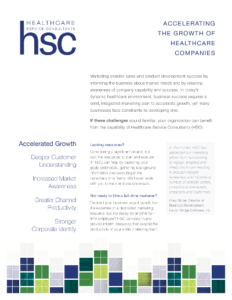Table of Contents
This is part 2 of our series, Content Marketing in Healthcare IT. In this article, we’ll be discussing the white paper as a powerful tool in healthcare IT marketing. You may also enjoy reading part 1 (intro) and part 3 (blogs).
Many healthcare IT solutions are inherently complex and have equally complex sales cycles. The sales processes in the healthcare industry include a variety of decision makers and influencers such as:
- executive leadership
- clinical specialists
- operational managers
- IT professionals
You must explain the purpose and benefits of your product in a way that resonates with each individual’s perspective. This is a unique challenge selling into the healthcare IT market.
Enter the white paper.
1. White Papers: The Basics
White papers are educational in nature. They inform consumers about a specific challenge they may be experiencing, but do not fully understand. White papers serve as long-form content—ranging from 2,000 to 2,500 words or more—and intend to engage your audience at a deeper level. These documents also afford you the opportunity to explore your problem statements and value propositions through the lens of more than one stakeholder.
This form of content is an excellent starting point for expanding content marketing programs. You can break them down into other short-form content pieces, such as:
- blogs
- case studies
- social media posts
- and more
2. What a White Paper Is (and Isn’t)
There are many misconceptions surrounding the nature and purpose of the white paper. For instance, some industries perceive white papers as highly technical documents. While they are appropriate for this purpose, they have a focused application in the healthcare IT space.
Healthcare product marketers can use white papers to simplify complex concepts using language, use cases, and evidence that appeal to each key buyer persona. As such, the white paper explores problems, their impact, and the value of solving them from many different angles. This can include factors that demonstrate the novelty and usefulness of a product, including:
- business (operational and financial)
- clinical
- technical
Another common misconception is that white papers are promotional tools. While they may position a specific solution as superior, they should not promote products. Nor should they include company opinion.
White papers are top-of-funnel documents. Their intention is to create awareness about the presence, pervasiveness, and impact of the problems your solution addresses. They educate prospects on how your solution addresses those problems. Wherever possible, use customer experiences and supporting evidence to reinforce your position. In doing so, you will add depth and credibility to your white paper. This approach is much more powerful than opinion-based promotional statements.
3. Unique Considerations for Healthcare Audiences
Again, healthcare audiences are unique. They are risk-averse, rely on science and proof points, and tend to be skeptical of embellished claims. To be effective marketing tools, healthcare IT white papers must provide answers to the following four key questions:
- What is the problem and how is it impacting my department?
- What kind of technology would I use to solve this problem?
- What are the benefits of implementing such a solution?
- Has it proven successful before?
In answering these questions, you will ensure your white paper generates interest and awareness among your key buyer personas. By citing reliable third-party industry sources and providing tangible examples of customer success stories, you can quickly reinforce that your technology’s potential benefits have been well thought out. This reduces skepticism and increases confidence among your prospects, piquing their curiosity and desire to learn more about your company and solution.
4. Developing a Content Marketing Strategy and Plan
White papers are educational tools that provide in-depth, yet relatable discussions of novel technology solutions to pervasive healthcare problems. They engage your audience by building awareness of a problem they may be experiencing, as well as an understanding of the impact of that problem. They establish credibility and thought leadership in your organization using factual, unbiased information backed by market or academic evidence.
Because white papers are long-form content that may look at a solution from multiple angles, they force the product marketer to carefully think through the problem statements and perspectives of each buyer persona. They provide an excellent foundation for other short-form assets, making them well worth the time and investment to develop.
5. We’re Here to Help
Our team of healthcare IT product marketing experts have authored many white papers. We are ready to help you develop content that builds credibility and awareness of your products across your target audience. Contact Healthcare Service Consultants to learn more.




